中考英语二轮专题复习——介词 课件(共63张PPT)
文档属性
| 名称 | 中考英语二轮专题复习——介词 课件(共63张PPT) |
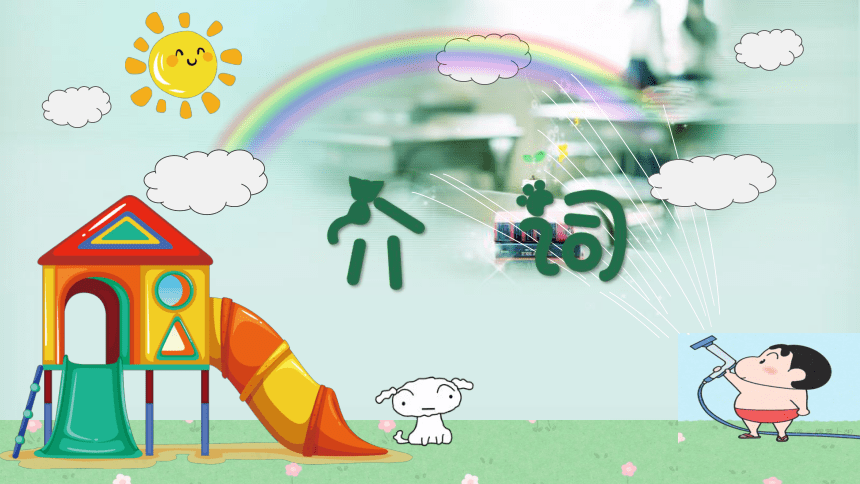
|
|
| 格式 | pptx | ||
| 文件大小 | 28.2MB | ||
| 资源类型 | 教案 | ||
| 版本资源 | 通用版 | ||
| 科目 | 英语 | ||
| 更新时间 | 2022-04-18 00:00:00 | ||
图片预览

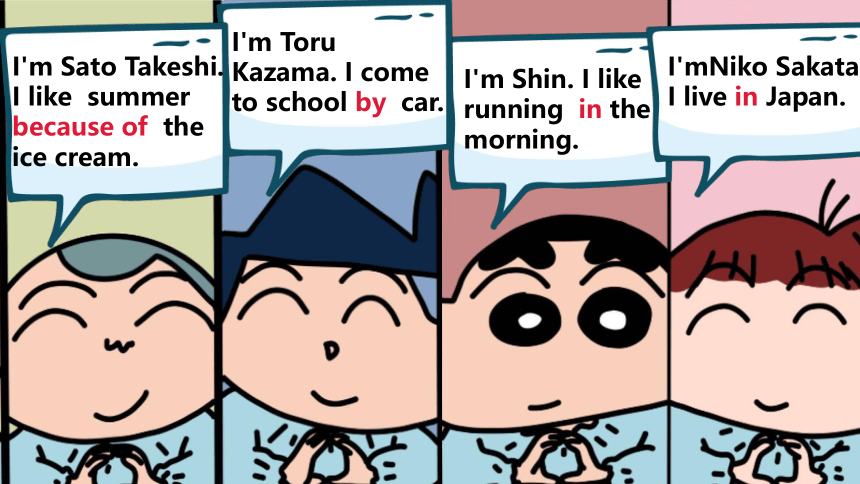
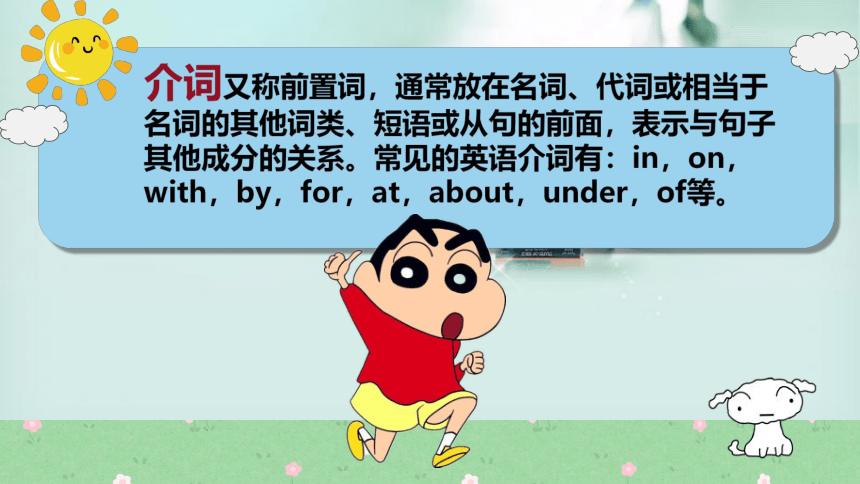

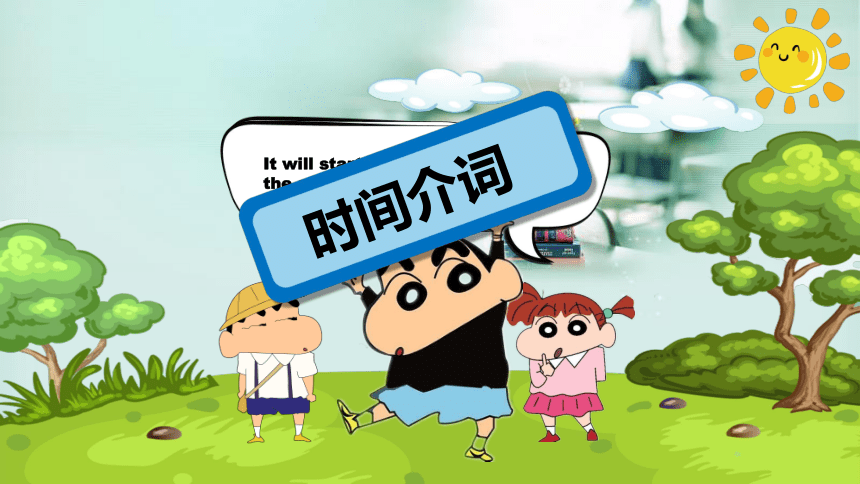
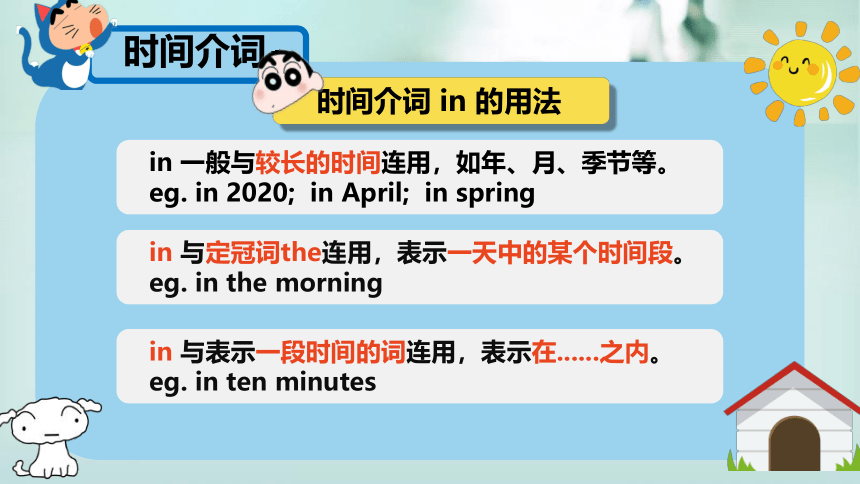
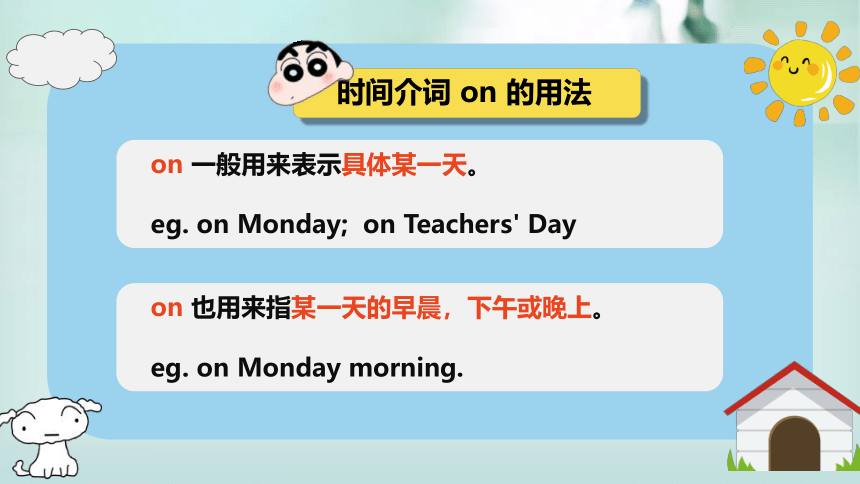
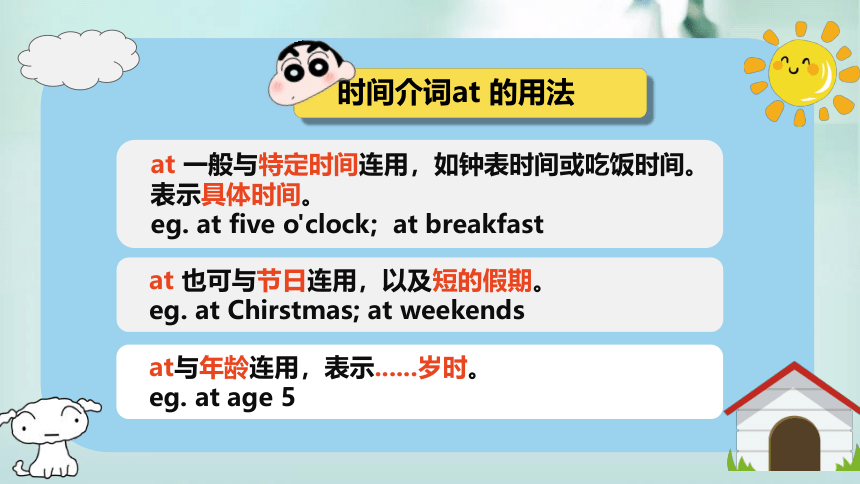
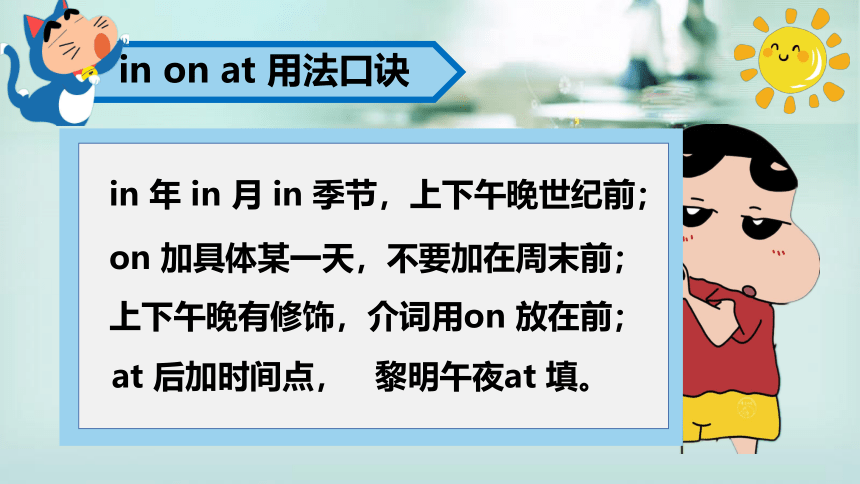
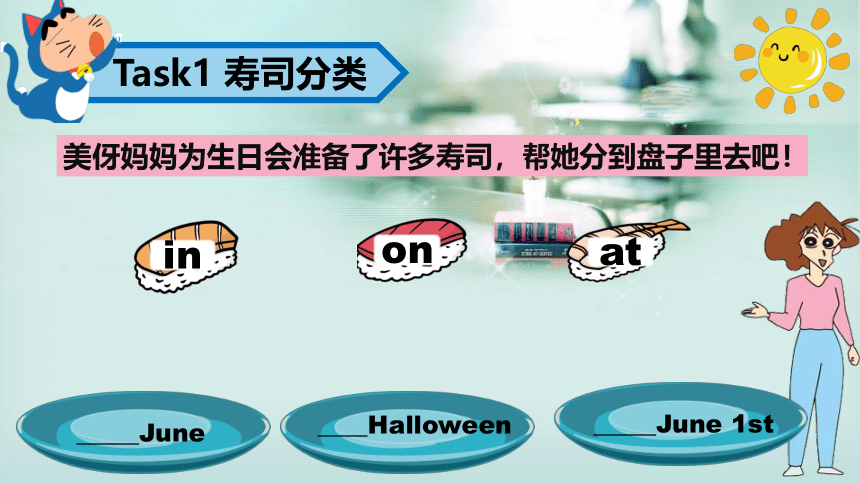
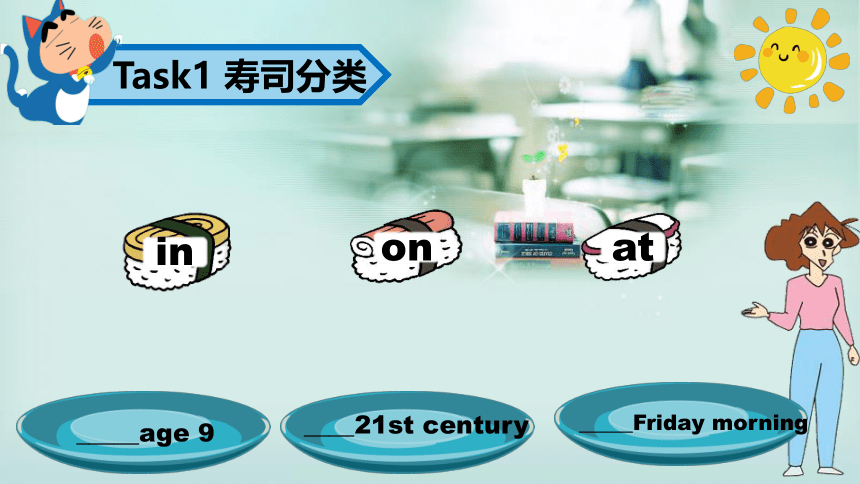
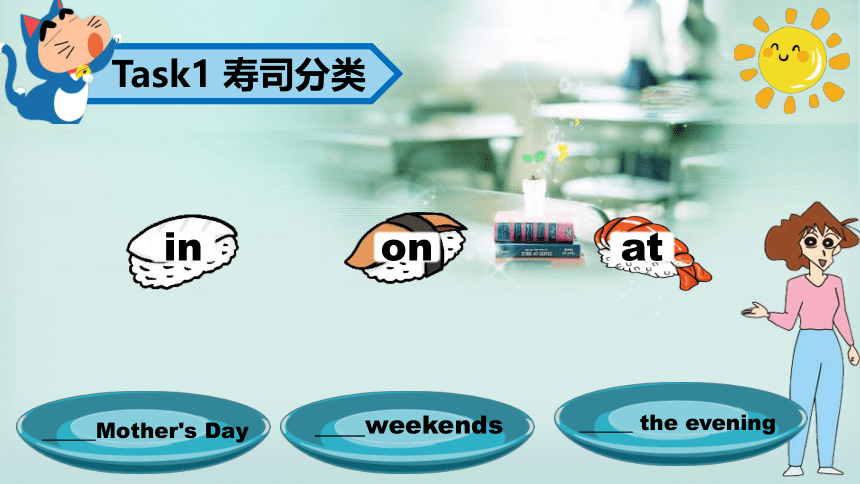
文档简介
(共63张PPT)
I'm Shin. I like running in the morning.
I'm Toru Kazama. I come to school by car.
I'mNiko Sakata. I live in Japan.
I'm Sato Takeshi. I like summer because of the ice cream.
介词又称前置词,通常放在名词、代词或相当于名词的其他词类、短语或从句的前面,表示与句子其他成分的关系。常见的英语介词有:in,on,with,by,for,at,about,under,of等。
介词的分类
时间介词
方位介词
方式介词
原因介词
其他介词
My birthday is on the thirteenth of April. I'll have a party. Would you come to my party
I'd love to. When will it start
It will start at five in the afternoon.
时间介词
时间介词
in 一般与较长的时间连用,如年、月、季节等。
eg. in 2020; in April; in spring
时间介词 in 的用法
in 与定冠词the连用,表示一天中的某个时间段。
eg. in the morning
in 与表示一段时间的词连用,表示在......之内。
eg. in ten minutes
on 一般用来表示具体某一天。
eg. on Monday; on Teachers' Day
时间介词 on 的用法
on 也用来指某一天的早晨,下午或晚上。
eg. on Monday morning.
at 一般与特定时间连用,如钟表时间或吃饭时间。
表示具体时间。
eg. at five o'clock; at breakfast
时间介词at 的用法
at 也可与节日连用,以及短的假期。
eg. at Chirstmas; at weekends
at与年龄连用,表示......岁时。
eg. at age 5
in on at 用法口诀
in 年 in 月 in 季节,上下午晚世纪前;
on 加具体某一天,不要加在周末前;
上下午晚有修饰,介词用on 放在前;
at 后加时间点, 黎明午夜at 填。
Task1 寿司分类
_____June
美伢妈妈为生日会准备了许多寿司,帮她分到盘子里去吧!
in
_____June 1st
____Halloween
on
at
Task1 寿司分类
_____age 9
_____Friday morning
____21st century
in
on
at
Task1 寿司分类
_____Mother's Day
_____ the evening
____weekends
in
at
on
during 和 for 都可以与表示时间段的词连用。
区别在于:during 强调动作发生的时间,意为在......期间内。
而 for 则强调动作持续的时间长度。
eg.
Did you see the meteor shower(流星雨) during these two years
在这两年里你看过流星雨吗?
I have been here for two years.
我来这里已经两年了。
其他时间介词
during
for
VS
until
by
VS
until 和 by 都有到......为止的意思。
until 用于肯定句时,意为到......为止 。
eg. I will work here until 10 o'clock.
我将在这儿工作到十点。
until 用于否定句时,与not 构成not...until.
意为直到......才。
eg. I won't work until 10 o'clock.
我直到十点才会工作。
until
by
VS
by + 将来时间点,用一般将来时
by 到......为止
Lunch will be ready by eleven.
by + 过去时间点,用过去完成时
We had leant 1000 words by last term.
Task 2 蛋糕制作
美伢妈妈正在准备生日蛋糕,快来帮帮她吧!
I have studied English ________two years.
for
Task 2 蛋糕制作
They will have a good rest ________this summer holiday.
during
Task 2 蛋糕制作
I will finish the task _______nine.
by
Task 2 蛋糕制作
My dad didn't come back _______midnight.
until
Can you help Shin find the presents in the living room
There is a present on the sofa.
There is a present behind the sofa.
There is a present under the desk.
方位介词
表示地点的介词
表示空间方位的介词
方位介词
表地点的介词
in、on、at 、to的用法
介词 at in on to
意义 表示在小地方或在......附近、旁边 表示在大地方或表示在......范围内 表示毗邻、接壤 表示在......范围外,不接壤
举例 He arrived at the station at ten. I live in Beijing. Guangdong is on the southeast of Guangxi. Japan lies to the east of China.
记忆小口诀
范围内部要用in;
at需加小地方;
on是毗邻要接壤;
范围外面不接壤;
用to一定不能忘。
in
at
to
on
Task 3 选择礼物
( ) China lies ____ the west of Japan.
at
in
on
to
中国、日本不接壤
Task 3 选择礼物
( ) On the afternoon of June 2nd, many foreigners arrived________ Shanghai.
at
in
on
to
上海 :大地点
Task 3 选择礼物
( ) Shanghai is ____ the east of Jiangsu Province.
at
in
on
to
上海和江苏省接壤
Task 3 选择礼物
( ) He is waiting for the bus ____ the bus stop.
at
in
on
to
公交站小地点
表空间方位的介词
1. 在......里面 : in、inside
in侧重于表示“在里面”的静止状态或者在一定范围内的动作。
eg. The Little White is in the box .
inside侧重于表示在内部,强调被包围的意思,语气也比in强。
eg. The Little White goes inside his house.
表空间方位的介词
2. 在......外面 : out、outside
out有向外的意思,常与动词连用。如go out。
eg. The Little White comes out from the box .
outside表示在某个范围的外部。
eg. The Little White is playing outside his house.
表空间方位的介词
3. 在......上面 :on、over、above
介词 意义 举例 图示
on
over
above
在物体上方并与之接触
在物体正上方
在物体上方,不一定在正上方,也可指温度海拔等的刻度
The Little White sits on the desk.
There is a boat over the river.
The sun is above the trees.
表空间方位的介词
4. 在......下面 :under、below、beneath
介词 意义 举例 图示
under
below
beneath
书面用词,在......之下,与物体有接触,或被某物覆盖着下面。也指比......低。
在物体正下方, 与over 相对
在物体下方,不一定在正下方,也可指温度海拔等的刻度,与above相对
The Little White sits under the desk.
The sun sank below the horizon.
Shin likes feeling the sand beneath his feet.
表空间方位的介词
5. 在......前面 :in front of 、in the front of
in front of 表示某一空间外部的前面,两者是分开的。
eg. There is a big tree in front of the house.
in the front of 表示某一空间内部的前面,两者是包容的。
eg. Shin is in the front of the bus.
表空间方位的介词
6. 在......后面 :behind、at the back of
behind表示某一空间外部的后面,两者是分开的。
eg. There is a big tree behind the house.
at the back of 表示某一空间内部的后面,两者是包容的。
eg. Shin is at the back of the bus.
表空间方位的介词
8. 在......旁边或附近 :beside、by、near
beside,by ,near 都表示在......旁边或附近。但near比前两者距离远一点。
eg. Shin sits beside/by /near Sakata .
Shin sits near Kazama
表空间方位的介词
9. 用法比较:across、through、past、over
介词
意义
举例
图示
across
through
past
over
横过,从物体的表面通过。
穿过,从物体的内部穿过。
经过,从物体的一旁经过。
越过,表达到达高的物体另一侧。
The Little White went across the road.
The Little White went through the hula hoop.
The Little White walked past Shin.
The Little White jumped over the wall.
方位介词记忆口诀
in 在里面on 在上, by 和 beside 在近旁;
above 表示在上方, below 则是反方向;
表示正上用over, under 表示正下方;
in front of 意在前, 反意behind 在后面;
at the back of 在后部,in the front of 内部前;
从里穿过用through, 表面通过用across;
past用在旁边过, over用于高处越;
between 用在两者间, among 用于大众间。
Task 4 森林探险
小新对于礼物VR很感兴趣,一起去VR的世界看一看吧!
The bird is _________the tree.
in
The frog is _________the rock.
on
The deer is jumping_________the river.
over
The house is _________________the bushes.
in front of
The rabbit is _________the house.
behind
The monkey is _________the house.
above
Make a wish, Shin.
I want to go to Beijing by plane this summer.
方式介词
方式介词
1. 乘坐 : by、in、on
by+交通工具/ 地理名词
但此时交通工具之前没有冠词或物主代词。
eg. by car, by bike,
by sea
in/on+冠词/物主代词/指示代词+交通工具。
区别:开放式/半开放式交通工具用on; 封闭式交通工具用in。
eg. on my bike,
in my father's car
方式介词
2. 用 : by、in、with
by+方式、方法
eg. Shin's father successed by working hard .
in+材料/语言
eg. Can you say this in English
with+工具/物品
eg. They broke the window with a stone.
Task 5 可口甜点
This story is ________ simple English. I can read it.
We always chat _________WeChat.
He likes writing __________his left hand.
The cinema is near our home. We will go there _________foot.
It is raining. Lily gets __________ the taxi quickly.
You can write ________ my pen.
in
by
with
on
in
with
Would you like to go to Beijing with me?
Yes, I'd love to. Thank you for your invitation.
原因介词
Sorry!I can't.I'm afraid of taking the plane.
原因介词
of 的用法
of :因为;由于。一般和 afraid,tired, die 等词连用。
当与die 连用时,表示因饥饿、疾病,寒冷等引起的死亡。
eg. Shin is afraid of heights.
The girl died of cold and hunger.
原因介词
from 的用法
from :因为;由于。用于表示动机和原因。
当与die 连用时,表示因伤或事故,或其他不明原因等引起的死亡。
eg. I'm suffering from a cold.
You can die from that.
原因介词
for 的用法
for :因为;由于。用于表示理由、原因。
eg. He can't see the forest for the trees.
for 常与表示心理感觉或情绪的抽象名词连用。
eg. I just got those for fun.
for 也用于表示奖赏或处罚的原因。
eg. I wanna give you a reward for finding him.
原因介词
at 和over 的用法
at 常与表示喜怒哀乐等的形容词连用,表示感情上、感觉上的原因。
eg.We are surprised at her change.
over多用于情绪上的原因,常与cry、weep等动词连用。
eg. It is no use crying over spilled milk.
Task 6 神秘气球
美伢妈妈为小朋友们都准备了神秘礼物,就藏在气球中哦!快去试试吧!
The man is tired for the boring job.
His father died of the traffic accident.
The man is tired of the boring job.
His father died from the traffic accident.
Task 6 神秘气球
I am upset over its loss.
Thank you of your help.
I am upset at its loss.
Thank you for your help.
其他介词
1. 关于: on、about、 of
介词 意义 举例
on 涉及文章、书籍、演说、报告等内容时,两者通用 侧重于关于学术性的或严肃的内容 It's a textbook on the history of China.
about 指关于某人或某事物较详细的情况 Can you tell me something about Shin
of 仅指关于某人或某事物的存在。 He thought of this matter yesterday.
其他介词
2. 除......之外: except、besides
except: 除......之外,不包括在内。
eg. They went to Beijing except me.
除了我以外,他们都去了北京。
besides: 除......之外,包括在内。
eg. They went to Beijing besides me.
除了我以外,他们也去了北京。
Did you read your favorite books _______April 23 It was World Book Day.
A. for
B. at
C. in
D. on
D
Task 7 派对时刻
I will go around the city of Dalian _______ light-rail vehicle(轻轨)because I haven't taken it before.
A. by
B. at
C. with
D. in
A
Task 7 派对时刻
I think tea will taste better _______some milk in it.
A. for
B. with
C. from
D. at
B
Task 7 派对时刻
We can save money_________cooking our own meals instead of eating outside.
A. by
B. to
C. for
D. with
A
Task 7 派对时刻
In the picture, he sits ______me, looking very happy.
A. among
B. up
C. beside
D. through
C
Task 7 派对时刻
China is ______ the east of Asia.
A. between
B. at
C. to
D. in
D
Task 7 派对时刻
Thanks _________inviting me to your party.
A. with
B. for
C. of
D. to
C
Task 7 派对时刻
Thank you for coming to my party. I am very happy today.
I'm Shin. I like running in the morning.
I'm Toru Kazama. I come to school by car.
I'mNiko Sakata. I live in Japan.
I'm Sato Takeshi. I like summer because of the ice cream.
介词又称前置词,通常放在名词、代词或相当于名词的其他词类、短语或从句的前面,表示与句子其他成分的关系。常见的英语介词有:in,on,with,by,for,at,about,under,of等。
介词的分类
时间介词
方位介词
方式介词
原因介词
其他介词
My birthday is on the thirteenth of April. I'll have a party. Would you come to my party
I'd love to. When will it start
It will start at five in the afternoon.
时间介词
时间介词
in 一般与较长的时间连用,如年、月、季节等。
eg. in 2020; in April; in spring
时间介词 in 的用法
in 与定冠词the连用,表示一天中的某个时间段。
eg. in the morning
in 与表示一段时间的词连用,表示在......之内。
eg. in ten minutes
on 一般用来表示具体某一天。
eg. on Monday; on Teachers' Day
时间介词 on 的用法
on 也用来指某一天的早晨,下午或晚上。
eg. on Monday morning.
at 一般与特定时间连用,如钟表时间或吃饭时间。
表示具体时间。
eg. at five o'clock; at breakfast
时间介词at 的用法
at 也可与节日连用,以及短的假期。
eg. at Chirstmas; at weekends
at与年龄连用,表示......岁时。
eg. at age 5
in on at 用法口诀
in 年 in 月 in 季节,上下午晚世纪前;
on 加具体某一天,不要加在周末前;
上下午晚有修饰,介词用on 放在前;
at 后加时间点, 黎明午夜at 填。
Task1 寿司分类
_____June
美伢妈妈为生日会准备了许多寿司,帮她分到盘子里去吧!
in
_____June 1st
____Halloween
on
at
Task1 寿司分类
_____age 9
_____Friday morning
____21st century
in
on
at
Task1 寿司分类
_____Mother's Day
_____ the evening
____weekends
in
at
on
during 和 for 都可以与表示时间段的词连用。
区别在于:during 强调动作发生的时间,意为在......期间内。
而 for 则强调动作持续的时间长度。
eg.
Did you see the meteor shower(流星雨) during these two years
在这两年里你看过流星雨吗?
I have been here for two years.
我来这里已经两年了。
其他时间介词
during
for
VS
until
by
VS
until 和 by 都有到......为止的意思。
until 用于肯定句时,意为到......为止 。
eg. I will work here until 10 o'clock.
我将在这儿工作到十点。
until 用于否定句时,与not 构成not...until.
意为直到......才。
eg. I won't work until 10 o'clock.
我直到十点才会工作。
until
by
VS
by + 将来时间点,用一般将来时
by 到......为止
Lunch will be ready by eleven.
by + 过去时间点,用过去完成时
We had leant 1000 words by last term.
Task 2 蛋糕制作
美伢妈妈正在准备生日蛋糕,快来帮帮她吧!
I have studied English ________two years.
for
Task 2 蛋糕制作
They will have a good rest ________this summer holiday.
during
Task 2 蛋糕制作
I will finish the task _______nine.
by
Task 2 蛋糕制作
My dad didn't come back _______midnight.
until
Can you help Shin find the presents in the living room
There is a present on the sofa.
There is a present behind the sofa.
There is a present under the desk.
方位介词
表示地点的介词
表示空间方位的介词
方位介词
表地点的介词
in、on、at 、to的用法
介词 at in on to
意义 表示在小地方或在......附近、旁边 表示在大地方或表示在......范围内 表示毗邻、接壤 表示在......范围外,不接壤
举例 He arrived at the station at ten. I live in Beijing. Guangdong is on the southeast of Guangxi. Japan lies to the east of China.
记忆小口诀
范围内部要用in;
at需加小地方;
on是毗邻要接壤;
范围外面不接壤;
用to一定不能忘。
in
at
to
on
Task 3 选择礼物
( ) China lies ____ the west of Japan.
at
in
on
to
中国、日本不接壤
Task 3 选择礼物
( ) On the afternoon of June 2nd, many foreigners arrived________ Shanghai.
at
in
on
to
上海 :大地点
Task 3 选择礼物
( ) Shanghai is ____ the east of Jiangsu Province.
at
in
on
to
上海和江苏省接壤
Task 3 选择礼物
( ) He is waiting for the bus ____ the bus stop.
at
in
on
to
公交站小地点
表空间方位的介词
1. 在......里面 : in、inside
in侧重于表示“在里面”的静止状态或者在一定范围内的动作。
eg. The Little White is in the box .
inside侧重于表示在内部,强调被包围的意思,语气也比in强。
eg. The Little White goes inside his house.
表空间方位的介词
2. 在......外面 : out、outside
out有向外的意思,常与动词连用。如go out。
eg. The Little White comes out from the box .
outside表示在某个范围的外部。
eg. The Little White is playing outside his house.
表空间方位的介词
3. 在......上面 :on、over、above
介词 意义 举例 图示
on
over
above
在物体上方并与之接触
在物体正上方
在物体上方,不一定在正上方,也可指温度海拔等的刻度
The Little White sits on the desk.
There is a boat over the river.
The sun is above the trees.
表空间方位的介词
4. 在......下面 :under、below、beneath
介词 意义 举例 图示
under
below
beneath
书面用词,在......之下,与物体有接触,或被某物覆盖着下面。也指比......低。
在物体正下方, 与over 相对
在物体下方,不一定在正下方,也可指温度海拔等的刻度,与above相对
The Little White sits under the desk.
The sun sank below the horizon.
Shin likes feeling the sand beneath his feet.
表空间方位的介词
5. 在......前面 :in front of 、in the front of
in front of 表示某一空间外部的前面,两者是分开的。
eg. There is a big tree in front of the house.
in the front of 表示某一空间内部的前面,两者是包容的。
eg. Shin is in the front of the bus.
表空间方位的介词
6. 在......后面 :behind、at the back of
behind表示某一空间外部的后面,两者是分开的。
eg. There is a big tree behind the house.
at the back of 表示某一空间内部的后面,两者是包容的。
eg. Shin is at the back of the bus.
表空间方位的介词
8. 在......旁边或附近 :beside、by、near
beside,by ,near 都表示在......旁边或附近。但near比前两者距离远一点。
eg. Shin sits beside/by /near Sakata .
Shin sits near Kazama
表空间方位的介词
9. 用法比较:across、through、past、over
介词
意义
举例
图示
across
through
past
over
横过,从物体的表面通过。
穿过,从物体的内部穿过。
经过,从物体的一旁经过。
越过,表达到达高的物体另一侧。
The Little White went across the road.
The Little White went through the hula hoop.
The Little White walked past Shin.
The Little White jumped over the wall.
方位介词记忆口诀
in 在里面on 在上, by 和 beside 在近旁;
above 表示在上方, below 则是反方向;
表示正上用over, under 表示正下方;
in front of 意在前, 反意behind 在后面;
at the back of 在后部,in the front of 内部前;
从里穿过用through, 表面通过用across;
past用在旁边过, over用于高处越;
between 用在两者间, among 用于大众间。
Task 4 森林探险
小新对于礼物VR很感兴趣,一起去VR的世界看一看吧!
The bird is _________the tree.
in
The frog is _________the rock.
on
The deer is jumping_________the river.
over
The house is _________________the bushes.
in front of
The rabbit is _________the house.
behind
The monkey is _________the house.
above
Make a wish, Shin.
I want to go to Beijing by plane this summer.
方式介词
方式介词
1. 乘坐 : by、in、on
by+交通工具/ 地理名词
但此时交通工具之前没有冠词或物主代词。
eg. by car, by bike,
by sea
in/on+冠词/物主代词/指示代词+交通工具。
区别:开放式/半开放式交通工具用on; 封闭式交通工具用in。
eg. on my bike,
in my father's car
方式介词
2. 用 : by、in、with
by+方式、方法
eg. Shin's father successed by working hard .
in+材料/语言
eg. Can you say this in English
with+工具/物品
eg. They broke the window with a stone.
Task 5 可口甜点
This story is ________ simple English. I can read it.
We always chat _________WeChat.
He likes writing __________his left hand.
The cinema is near our home. We will go there _________foot.
It is raining. Lily gets __________ the taxi quickly.
You can write ________ my pen.
in
by
with
on
in
with
Would you like to go to Beijing with me?
Yes, I'd love to. Thank you for your invitation.
原因介词
Sorry!I can't.I'm afraid of taking the plane.
原因介词
of 的用法
of :因为;由于。一般和 afraid,tired, die 等词连用。
当与die 连用时,表示因饥饿、疾病,寒冷等引起的死亡。
eg. Shin is afraid of heights.
The girl died of cold and hunger.
原因介词
from 的用法
from :因为;由于。用于表示动机和原因。
当与die 连用时,表示因伤或事故,或其他不明原因等引起的死亡。
eg. I'm suffering from a cold.
You can die from that.
原因介词
for 的用法
for :因为;由于。用于表示理由、原因。
eg. He can't see the forest for the trees.
for 常与表示心理感觉或情绪的抽象名词连用。
eg. I just got those for fun.
for 也用于表示奖赏或处罚的原因。
eg. I wanna give you a reward for finding him.
原因介词
at 和over 的用法
at 常与表示喜怒哀乐等的形容词连用,表示感情上、感觉上的原因。
eg.We are surprised at her change.
over多用于情绪上的原因,常与cry、weep等动词连用。
eg. It is no use crying over spilled milk.
Task 6 神秘气球
美伢妈妈为小朋友们都准备了神秘礼物,就藏在气球中哦!快去试试吧!
The man is tired for the boring job.
His father died of the traffic accident.
The man is tired of the boring job.
His father died from the traffic accident.
Task 6 神秘气球
I am upset over its loss.
Thank you of your help.
I am upset at its loss.
Thank you for your help.
其他介词
1. 关于: on、about、 of
介词 意义 举例
on 涉及文章、书籍、演说、报告等内容时,两者通用 侧重于关于学术性的或严肃的内容 It's a textbook on the history of China.
about 指关于某人或某事物较详细的情况 Can you tell me something about Shin
of 仅指关于某人或某事物的存在。 He thought of this matter yesterday.
其他介词
2. 除......之外: except、besides
except: 除......之外,不包括在内。
eg. They went to Beijing except me.
除了我以外,他们都去了北京。
besides: 除......之外,包括在内。
eg. They went to Beijing besides me.
除了我以外,他们也去了北京。
Did you read your favorite books _______April 23 It was World Book Day.
A. for
B. at
C. in
D. on
D
Task 7 派对时刻
I will go around the city of Dalian _______ light-rail vehicle(轻轨)because I haven't taken it before.
A. by
B. at
C. with
D. in
A
Task 7 派对时刻
I think tea will taste better _______some milk in it.
A. for
B. with
C. from
D. at
B
Task 7 派对时刻
We can save money_________cooking our own meals instead of eating outside.
A. by
B. to
C. for
D. with
A
Task 7 派对时刻
In the picture, he sits ______me, looking very happy.
A. among
B. up
C. beside
D. through
C
Task 7 派对时刻
China is ______ the east of Asia.
A. between
B. at
C. to
D. in
D
Task 7 派对时刻
Thanks _________inviting me to your party.
A. with
B. for
C. of
D. to
C
Task 7 派对时刻
Thank you for coming to my party. I am very happy today.
同课章节目录
- 词法
- 名词
- 动词和动词短语
- 动词语态
- 动词时态
- 助动词和情态动词
- 非谓语动词
- 冠词
- 代词
- 数词和量词
- 形容词副词及其比较等级
- 介词和介词短语
- 连词和感叹词
- 构词法
- 相似、相近词比较
- 句法
- 陈述句
- 一般疑问句和否定疑问句
- 特殊疑问句及选择疑问句
- 反意疑问句
- 存在句(There be句型)
- 宾语从句
- 定语从句
- 状语从句
- 主谓一致问题
- 简单句
- 并列句
- 复合句
- 主谓一致
- 主、表语从句
- 名词性从句
- 直接引语和间接引语
- 虚拟语气
- 感叹句
- 强调句
- 倒装句
- 祈使句
- 句子的成分
- 句子的分类
- 题型专区
- 单项选择部分
- 易错题
- 完形填空
- 阅读理解
- 词汇练习
- 听说训练
- 句型转换
- 补全对话
- 短文改错
- 翻译
- 书面表达
- 任务型阅读
- 语法填空
- 其他资料
